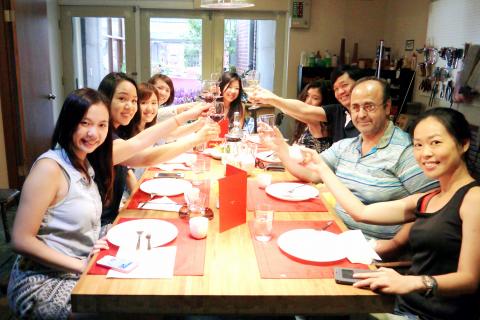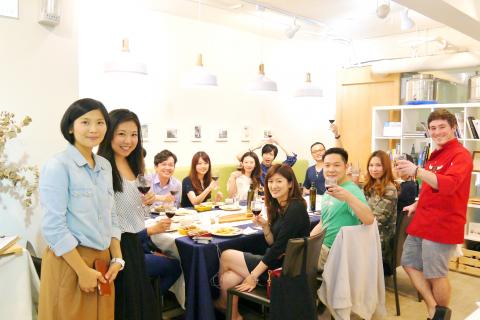Food2gather co-founders Jenny Peng (彭子珮) and Judy Wu (吳佳臻), believe that most of us have probably eaten food created by molecular gastronomy techniques but just don’t know it.
The term is used to describe the application of physics and chemistry to transform the flavors and textures of food. Cotton candy is a prime example, as it is hard sugar transformed into candy floss.
Tomorrow’s “Tea Time Wonderland,” organized by Food2gather at the arts and crafts store Creative Collection (三省太和), will include a lineup of foods and desserts created by molecular gastronomy. The menu includes souffle omelet and a chocolate meteorite dessert, all prepared by chefs from the French fusion restaurant Facile (法斯樂).

Photo courtesy of Food2gather
Food2gather is an an online platform that brings foodies and aspiring chefs together through regular events, usually a couple times per month. In the past, they’ve thrown a South African braai and a Spanish paella party. The concept is simple: the chefs cook, the foodies eat and provide feedback. Guests make friends and bond over good food. Sometimes there are cooking demonstrations and classes. Often times, wine is involved, too.
“Each event aims to provide one-of-a-kind dining experience,” Peng tells the Taipei Times.
The grand finale of tomorrow’s event, for instance, will incorporate a “dessert magic show” where chefs will use nitrogen gas and carbon dioxide to produce smoke, bubbles and other effects.

Photo courtesy of Food2gather
Wu says it won’t be your typical afternoon tea, as the emphasis is placed on a sensory experience in a unique setting where diners can interact with the chefs.
“Chefs [will] share their talent, their knowledge, their story behind the cuisines with guests,” Wu says.
She adds that diners were asking detailed questions about food preparation at their previous molecular gastronomy events.
Peng thinks that this curiosity to understand the ingredients and processes is partly due to the recent scandals over food safety in Taiwan.
“Taiwanese have grown to be more cautious,” she says. “This may have led to the increase of healthier eating options like vegan food.”
As such, the duo also hopes that events such as tomorrow’s Tea Time Wonderland will help cater to the growing crop of people who are seeking healthier and affordable dining options.

One of the most important gripes that Taiwanese have about the Democratic Progressive Party (DPP) is that it has failed to deliver concretely on higher wages, housing prices and other bread-and-butter issues. The parallel complaint is that the DPP cares only about glamor issues, such as removing markers of Chinese Nationalist Party (KMT) colonialism by renaming them, or what the KMT codes as “de-Sinification.” Once again, as a critical election looms, the DPP is presenting evidence for that charge. The KMT was quick to jump on the recent proposal of the Ministry of the Interior (MOI) to rename roads that symbolize

On the evening of June 1, Control Yuan Secretary-General Lee Chun-yi (李俊俋) apologized and resigned in disgrace. His crime was instructing his driver to use a Control Yuan vehicle to transport his dog to a pet grooming salon. The Control Yuan is the government branch that investigates, audits and impeaches government officials for, among other things, misuse of government funds, so his misuse of a government vehicle was highly inappropriate. If this story were told to anyone living in the golden era of swaggering gangsters, flashy nouveau riche businessmen, and corrupt “black gold” politics of the 1980s and 1990s, they would have laughed.

It was just before 6am on a sunny November morning and I could hardly contain my excitement as I arrived at the wharf where I would catch the boat to one of Penghu’s most difficult-to-access islands, a trip that had been on my list for nearly a decade. Little did I know, my dream would soon be crushed. Unsure about which boat was heading to Huayu (花嶼), I found someone who appeared to be a local and asked if this was the right place to wait. “Oh, the boat to Huayu’s been canceled today,” she told me. I couldn’t believe my ears. Surely,

When Lisa, 20, laces into her ultra-high heels for her shift at a strip club in Ukraine’s Kharkiv, she knows that aside from dancing, she will have to comfort traumatized soldiers. Since Russia’s 2022 invasion, exhausted troops are the main clientele of the Flash Dancers club in the center of the northeastern city, just 20 kilometers from Russian forces. For some customers, it provides an “escape” from the war, said Valerya Zavatska — a 25-year-old law graduate who runs the club with her mother, an ex-dancer. But many are not there just for the show. They “want to talk about what hurts,” she